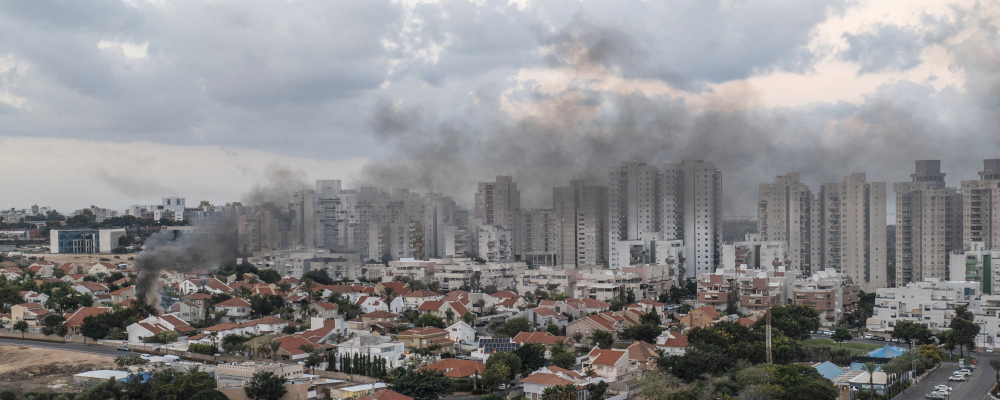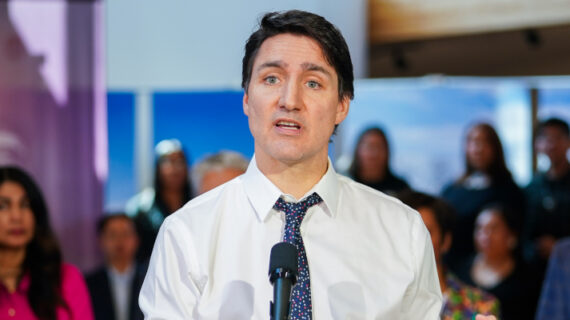Hamas terrorists launched an unprecedented surprise attack on Israel from the Gaza Strip early on Saturday morning, killing at least 250 Israelis and wounding at least 1,500 in the deadliest attack on the country in decades.
In response, Israel launched airstrikes in Gaza and Israeli Prime Minister Benjamin Netanyahu declared that his country is now “at war” and that it will inflict an “unprecedented price” on Hamas.
The Hub’s editor-at-large Sean Speer speaks with leading author, journalist, and thinker David Frum about what happens next in the region and what the response should be in Canada and the rest of the world.
SEAN SPEER: You regularly bring a historical perspective to our bi-weekly conversations. Put this weekend’s events in a historical context. How do they compare to past threats to the state of Israel and how does the ensuing military campaign compare to previous ones?
DAVID FRUM: October 7, 2023 was the deadliest singe day in Israel’s history. The toll of dead, wounded, and abducted far exceeds the worst day of the Yom Kippur war. The Yom Kippur war began as a surprise attack, but was otherwise a conventional military operation, aimed at military targets (if marred by atrocities against Israeli prisoners of war, especially by the Syrian forces). This Hamas massacre by contrast was primarily aimed at civilians, and especially against the most vulnerable: the elderly, children, and women. Sexual assault seems to have been integrated into the attack as deliberate tactic by Hamas. Tactics resemble a Nazi “Aktion” on the eastern front in the summer and fall 1941 more than any kind of military operation.
SEAN SPEER: Let me ask about Israel’s response to these awful attacks. What do you think it ought to be and what do you think it will be? Is there any gap between the two?
DAVID FRUM: With more than 100 Israelis abducted as hostages, it will be difficult for Israel to resist the urge to send troops to rescue them. This is the action Hamas seems to invite, and in general it’s dangerous to do things the enemy invites one to do. Urban warfare on and under the streets of densely inhabited Gaza seems unlikely to lead to positive results for Israel.
Israel’s strategic goal needs to be the elimination of Hamas as a political force. This goal needs to be pursued by all means, not only—and maybe not even primarily—military means. The Hamas leadership is sheltered by Qatar. If that continues any longer, Qatar should be regarded as a belligerent power, not a neutral. No more Hamas in Qatar, no more Qatari funds to Hamas, or else Qatar becomes a target of retaliation equal to Hamas.
Western nations that fund Hamas by sending money to UN agencies in Gaza should cut off aid until they feel absolutely confident that none is diverted. Gaza itself needs to be isolated economically by land, sea, and tunnels. Egyptian support will be vital, reminding everyone that this war should not be unilateral by Israel. An informal coalition must be assembled, ideally one that includes Saudi Arabia and the Gulf Arab states too, even if only tacitly.
Hamas’ principal backer is Iran. It may make more sense to retaliate against available Iranian targets than to act inside Gaza. Israel should be pressing the United States, the European Union, India, and Japan to reimpose the maximum sanctions on Iran that squeezed that country so hard a decade ago.
Hamas has a huge number of barely literate, sexually frustrated, underemployed young foot soldiers at its disposal. Little is accomplished by directing action against them. My rule of thumb would be: if a response looks impressive on cable news, it’s probably not very useful. If the top hundred Hamas leaders are still alive six months from now, however, that will be a significant failure.
SEAN SPEER: There’s been a lot of speculation about Iran’s role in inspiring and supporting Hamas in carrying out these attacks. What does it tell us about U.S.-Iran relations and how do you think it will affect American policy vis-a-vis Iran?
DAVID FRUM: The Obama administration’s deal to delay the Iranian nuclear program front-loaded all the benefits to Iran. The Trump administration canceled the deal but that only meant that Iran got to keep what it had already got. This might have been a valid approach if the Trump team had the ability and interest to reconstitute the international pressure on Iran that produced the Obama deal. Unfortunately, the Trump team couldn’t or wouldn’t. The result was the best of all possible worlds for Iran: they pocketed their winnings, they escaped their obligations, and they paid little price.
The Biden administration returned to Obama-style diplomacy, but under much less favorable conditions. Unsurprisingly, that approach has not worked either.
A new approach is needed. We need to begin by accepting that the Islamic Republic has no intention of ever being a responsible global partner to anyone. It’s a criminal regime through and through. It needs to be subject to the harshest possible sanction and isolation, not to obtain its signature on a piece of paper, but to reduce its ability to do harm.
Canada can play an important part here. Canada has given refuge to elite figures from the regime, their children, and their stolen money. That indulgence needs to stop. True refugees from Iran should be welcome. But Canada should not become a retirement community for former Iranian regime collaborators.
SEAN SPEER: I want to ask about American politics more generally. I didn’t observe some of the same tensions play out over the weekend that we’ve seen when it comes to supporting Ukraine. What do you think the consequences may be for U.S. politics? Will the attacks marginalize isolationist voices? Will it require renewed American focus on the Middle East? How else might these developments manifest themselves in American politics?
DAVID FRUM: I don’t think it’s accurate to describe the anti-Ukraine animus on the US political right as “isolationism.” Reactionary authoritarianism is a truly global movement, every bit as global as support for liberal democracy. The American far right has made an icon of Viktor Orban fully as much as of Donald Trump. Its information diet is traced to Russian sources, not American. Whatever you call this, it’s not “isolated.”
Support for Israel runs deep in US society. The Hamas horror in Israel could and should re-energize American commitment to friends and partners – and ideally should jolt the responsible part of the Republican Party to reclaim foreign-policy leadership from the sinister minority that has wielded too much influence.

SEAN SPEER: More generally, what should Israel’s allies, including Canada, be doing in light of these attacks and its ensuing military campaign?
DAVID FRUM: No funds to Hamas, even if laundered through UN agencies. No immigration papers for terrorists or their backers in Iran. No scolding at international forums.
Israel will need time to do its work. In the first shock of horror after a Hamas terrorist outrage, Canadians light up their national symbols with blue and white. Then a week passes, and Canadian politicians with an eye on domestic anti-Israel voters get impatient. They condemn violence on “both sides” and interpose to protect the terrorists from the consequences of their own aggression. Let’s not repeat that pattern that only perpetuates violence. Hamas started the war. Let Israel finish it.
Maybe above all: Canada should realize that Canada has become a field of operations for terrorist groups. Authoritarian governments conduct influence operations here. Jewish communities are exposed to intimidation and outright violence by local sympathizers with international terrorist organizations. Canada needs a deeper investment in security, more partnership with the US, UK, EU, Israel, Ukraine—and to reassert a firm commitment that anti-Jewish extremism will not be tolerated or indulged by Canadian society, no matter what excuse is offered to justify or condone.




